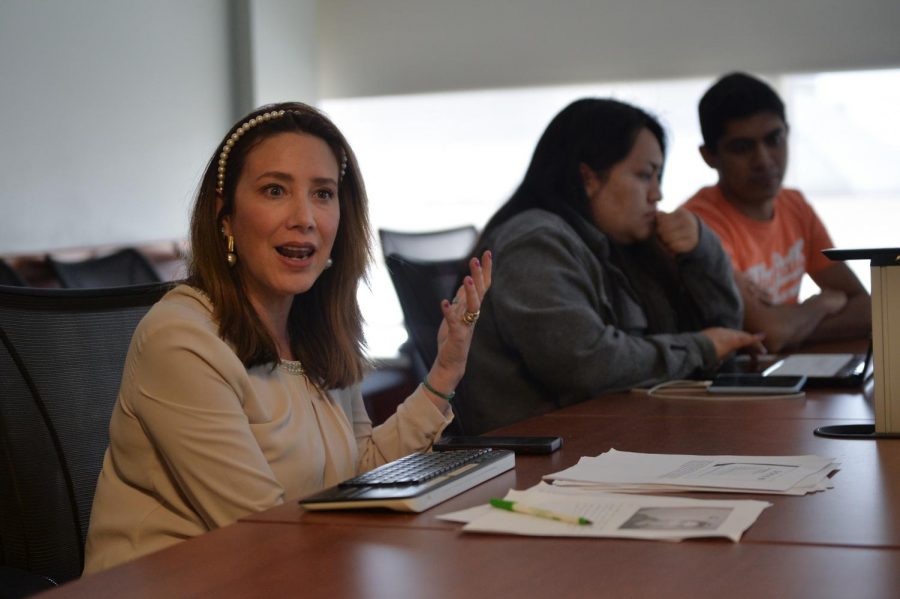Training addresses how to be an ally to undocumented students
Students attended session targeted toward faculty, staff on cultural consistency
BENJAMIN MICHAELIS | THE DAILY EVERGREEN
MSS Assistant Director Marcela Pattinson discusses why undocumented students should not be referred to as “illegals,” Tuesday at the CUB.
April 17, 2019
A representative from the Office of Multicultural Student Services (MSS) held an Undocu-Ally Training session discussing what it meant to be undocumented, how to be an ally and what resources are available for undocumented students.
Marcela Pattinson, assistant director of MSS community relations and outreach, said “undocumented” is used as an umbrella term and is considered the most inclusive term to be used when addressing undocumented students.
“It doesn’t matter if you came at three months, at two years or last night — it is undocumented,” Pattinson said.
She said calling undocumented people “illegals” criminalizes them.
Sofia Bastida, senior political science and English double major, said she is undocumented, unafraid and unapologetic.
“No human being is illegal,” she said.
Pattinson said institutions should be consistent when addressing undocumented people. She said WSU has made the effort to use “undocumented” terminology across all updated websites and handbooks.
“We are an undocumented-friendly institution,” Pattinson said. “That’s how institutions have an ownership to say, ‘We are proud to work with and for undocumented students. We advocate, we guide and facilitate undocumented trust.’ ”
She said allies should avoid making assumptions about an undocumented student’s story, and also be aware that being undocumented puts students at a disadvantage. She said the use of inclusive language opens the door of trust to undocumented students.
“To be an ally, you need to earn it,” she said. “You have to be an advocate, then an activist for [undocumented students].”
Pattinson said the most important part of being an ally is becoming educated on the resources available for undocumented students, and pointing them toward those resources when necessary.
“Now we have different programs and partnerships in place where we can help students. A lot of undocumented students don’t want to identify as undocumented, but it’s fine,” she said. “I’m always here for them. They can take their time.”
Pattinson said asking undocumented students to tell their stories during training sessions, speeches or presentations is revealing and difficult for them.
“It’s the only way we can really understand their stories,” she said, “but it’s like asking them to take their clothes off again and again.”
Jesus Policarpo, junior Spanish major, said he and his family immigrated to the U.S. after an attempted kidnapping of his father who was a doctor in Acapulco, Mexico.
Pattinson said Undocu-Ally training is mainly targeted toward faculty and staff at WSU because a large obstacle for undocumented students is academic funding. She said undocumented students have to apply for the WAFSA because undocumented students rarely receive federal financial aid.
Pattinson said undocumented students want to achieve and experience the same things as documented students, but have more difficulty doing so because of finances, mental health and their citizenship status.
“This is the experience of students [are] going through. They go through academic counseling, dream to go to study abroad and graduate school — things every student would like to go with,” she said. “How can you concentrate on going to school if you don’t know where you or your parents are going to be.”
Pattinson said undocumented students come from several different countries like Mexico, Ecuador, Korea and China.
“Guess who is the ones picking up the apples and the asparagus? They rely really heavily on the immigrants,” Pattinson said. “The majority of undocumented students in Washington are Mexicans. This is the reality because we are an agriculture state.”
She said different communities of undocumented people congregate in areas that are either similar to those that they came from or in places they can find work.
“If you go to the Vancouver area, you will feel that all the Undocumented is Eastern European. If you go down to the Seattle area you have those of [Asian-descendant],” she said. “If you go to Tacoma, you have African descendant, if you go eastern and central Washington you find a lot of the Latinos.”
She said undocumented students are negatively portrayed in the media, but despite undocumented people coming from multiple countries, Latinos are specifically targeted.
“The Eastern European, they blend. The African, they blend. The Asian, they blend. That’s the difference,” Pattinson said. “It’s easy to target the Latinos just because they cannot blend with the existing population in the landscape.”
Carolina Silva, a fifth-year student majoring in education, said although the training was made for faculty and staff, only students were in attendance.
“A donde estan?” Silva said.
Pattinson said if enough students educated themselves on how to be an ally, then maybe the faculty and staff would absorb the information “via osmosis.”
“Undocumented are, by nature, resilient,” she said.




















